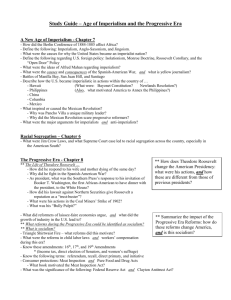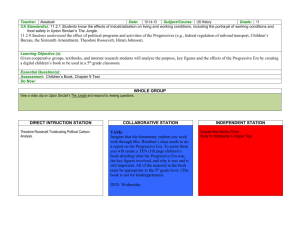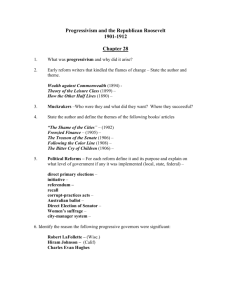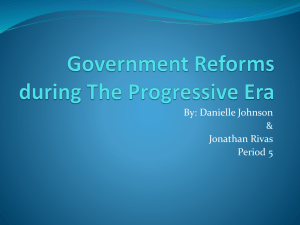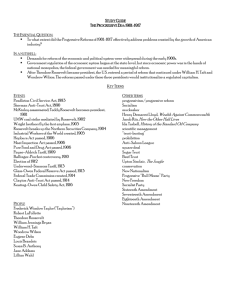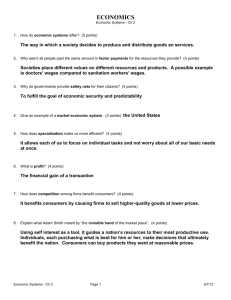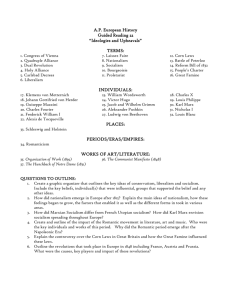Progressive Era - Theodore Roosevelt - 2015
advertisement
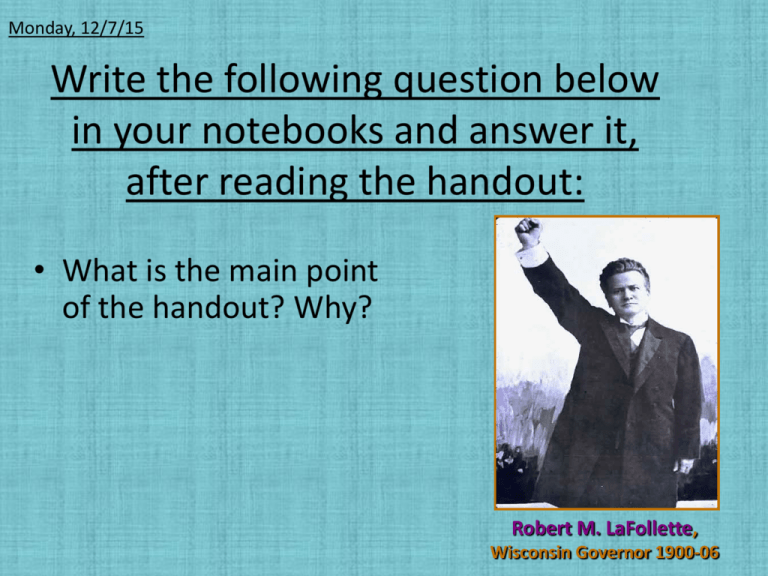
Monday, 12/7/15 Write the following question below in your notebooks and answer it, after reading the handout: • What is the main point of the handout? Why? Robert M. LaFollette, Wisconsin Governor 1900-06 “Progressive Reform Era” 1890s 1917 1901 1920s WHO were the “Progressives?” - Middle class reformers - Feared socialism & wealthy capitalists - Mexico, really, did not have a middle class during the early 1900’s. - ** How did this fact affect Mexican society during the early 1900’s? Theodore Roosevelt: the • The “Bully Pulpit” ** Video – Early years of TR’s presidency (questions) • Trust-buster – Northern Securities holding company (1902) • 1902 Coal Strike & arbitration “accidental President” Republican (1901-1909) Write the following questions below in your notebooks and answer it, working in smallgroups, and reading the textbook (pages 298-99, 302, 304, 310-311): • (1) What were the Progressive Era reforms, listed on these pages, meant to improve within the lives of the working- and middle-classes? How did they benefit? • (2) Could you argue we all today benefit from these changes? Why or why not? Wednesday, 12/9/15 Questions I forgot to include on the Study Guide, so make sure to write these down: • ** (1) How does Theodore Roosevelt change the American Presidency: what were his actions, and how these are different from those of previous presidents? • ** (2) Summarize the impact of the Progressive Era Reforms: how do these reforms change America, and is this socialism? Why or why not? “Progressive Era Reforms” Are these reforms socialism? Socialism vs. Progressivism • Regulation regarding child labor, workers’ compensation, limiting hours, zoning and building codes • Alcohol prohibition • Hepburn Act (1906) • Meat Inspection Act (1906) • Pure Food and Drug Act (1906) • Environmental Conservation • 16th Amendment – income tax • Federal Reserve Act • Clayton Antitrust Act K‐12.C.1 Students will explain, compare and contrast, and analyze the historical principles and philosophical purposes and various forms of governments. Socialism vs. Progressivism • Socialism is an economic system characterized by government ownership or social ownership of land, goods, resources and programs meant to “encourage” success by many Americans. – Redistribute wealth – Abolish capitalism or remove certain sectors of the economy away from the capitalist system – Goal: Public management of production resources • Progressivism in the U.S. is a political reform movement, generally considered to be middle class and reformist in nature. – – – – “Regulate” business Support capitalism Programs that help the working class Goal: raise the standard of living of the average member of society Reform at the City / State Level Socialism? • Child Labor – By 1929, every state banned children under 14 from working • Workers’ Compensation – Starting in 1911, 10 states passed laws requiring businesses to provide workers’ comp. • Zoning Laws – divided cities into commercial & residential sections • Building Codes – safer standards • Regulating Food and Drugs Why the reform? - Selections from The Jungle by Upton Sinclair – “They use everything about the hog except the squeal.” – “These rats were nuisances, and the packers would put poisoned bread out for them; they would die, and then rats, bread, and meat would go into the hoppers together.” – “[The] old sausage that had been rejected, and that was moldy and white – it would be dosed with borax and glycerine, and dumped, and made over again for home consumption.” Theodore Roosevelt: the “accidental President” Republican (1901-1909) • Meat Inspection Act (1906) – Federal Inspection of Meat-packing plants & standards of cleanliness • Pure Food and Drug Act (1906) Socialism? – Prohibited sale of impure drugs • Hepburn Act (1906) – Strengthens the I.C.C. ** Eliminated bribery used by railroads Theodore Roosevelt: the • National Forest Service “accidental President” (1905) Republican (1901-1909) Socialism? Conservationist vs. Preservationist – Managing forest resources • Antiquities Act (1906) – Protecting lands of historical & scientific interest and prehistoric lands – Gives the president “nearly-unfettered discretion” Socialism? • Other protected habitats - 51 bird sanctuaries - 5 national parks - 4 game refuges - 18 national monuments - 148 million acres of forest reserves - 80 million acres of protected under the U.S. Geological Survey CONSERVATION: National Parks and Forests Wilson’s Progressive Era Reforms • Sixteenth Amendment (1913) – income tax, new source of revenue!! • Federal Reserve Act (1913) • Federal Reserve Banking System Woodrow Wilson President 1913-21 Democrat • Clayton AntiTrust Act (1914) • Further regulated businesses • Allowed unions to exist Wilson at the peak of his power • Federal Reserve Act (1913) The Federal Reserve System … es muy importante Federal Reserve and Monetary Policy • Federal Reserve strives to manage the money supply as well as availability of credit with the goals of … – Maximum employment – Stable prices – Moderate long-term interest rates • (1) Open market operations – buying and selling securities, U.S. bonds • (2) The discount rate – interest charged other banks • (3) Reserve requirements – keeping $$$ on hand
